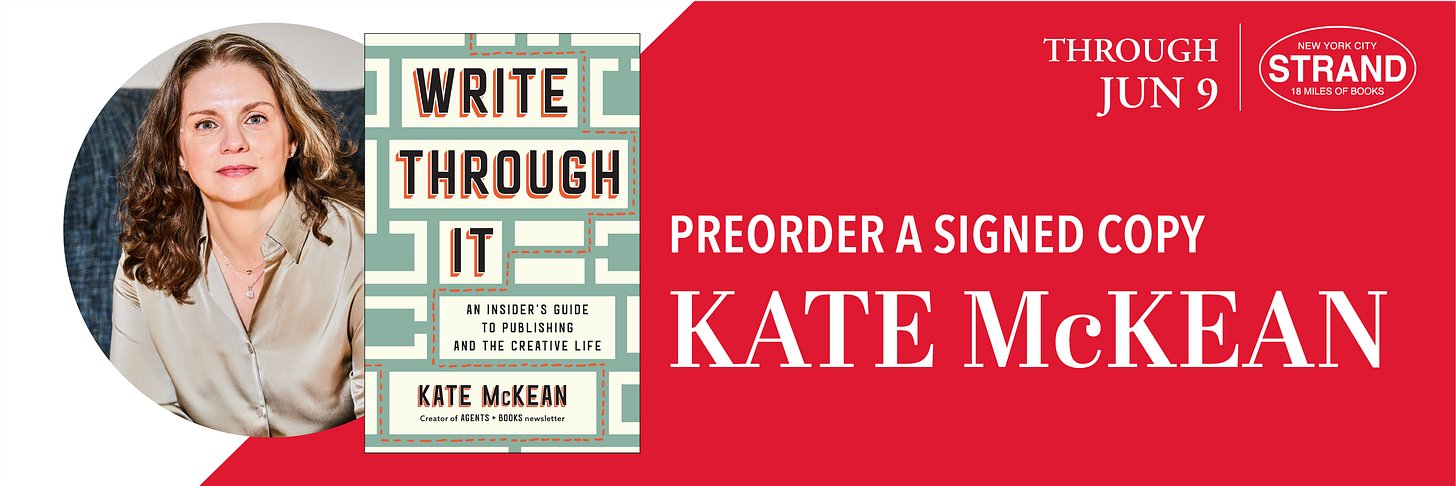Hey friends,
Every once in a while, I catch myself rattling off publishing jargon unsure if who I’m talking to knows what I mean—new clients, long-time clients, people who’ve accidentally asked me how’s work going? and I’m answering honestly. I even had this problem when writing my book. I frequently had to go back and search for a word just to make sure I’d made it’s meaning clear. After 20 years in publishing, I have to remember that everyone else hasn’t been living and breathing subsidiary rights and option clause their whole life. So, let’s do a quick primer on words we use often here just in case you’ve missed one, and/or you want to sound smart about publishing.
Advance: This is the money you get from the publisher. When people say they got a “six-figure book deal” they are referring to an advance amount. This money is an advance payment of the royalties the publisher thinks you’ll eventually earn. If you don’t earn out the advance, i.e. make all that money back for the publisher in sales, you do not owe the money back. You only owe the money back if you do not write the book or otherwise break the contract.
Royalties: You earn out your advance through royalties. A royalty is a percentage of the book price you earn every time a book is sold. Royalties differ from book to book, publisher to publisher, and genre to genre. It is common to receive a lower royalty on a book that is expensive to produce (i.e. a heavily illustrated cookbook) than it is on something less expensive to produce (i.e. a standard hardcover novel). Once you earn out your advance, that money accrues in your royalty account at the publisher, and twice year those are paid out to you, if any. Most books do not earn royalties. This is normal.
Grant of Rights: Every book contract outlines what the publisher gets to do with a book, called the grant of rights. There, and in other clauses, it will specify if the publisher can print and sell books everywhere in the world, or just North America; if they can translate it into other languages, or just publish it in English; if the publisher controls the audiobook rights, or if the author does. Their are standard grants of rights—the publisher usually gets the rights to produce hardcovers, paperbacks, ebooks, (most of the time) audiobooks, and other various editions, if there is demand for them. Many other things are negotiable.
Subsidiary Rights: Things that are not in the general grant of rights are considered subsidiary rights, or subrights, as we usually call them. Subrights can be TV/film rights, translation rights, software/app rights, theme park rights (yup), calendar rights, graphic novel adaptation rights, and more. The important subrights for your book may be different than your friend’s.
Translation Rights: If you’re reading this, it’s likely the primary language rights for your book will be the English Language Rights. You are probably looking to sell those rights to a US, UK, Australian, or Canadian publisher. Your book might have a market in other languages, though, and the grant of rights will specify who controls that. If a publisher controls translation rights, that means they have the ability, but not obligation, to see if other countries what your book in their language. They can license the French language rights to a French publisher, and that publisher will do the translation of your book. If the publisher has an office in that country, it doesn’t automatically mean your book will be published by them in that country. I know. You think they would want to do this! But every book market is extremely different and what works here might not work there.
IP: this stands for Intellectual Property and how you talk about it depends on who owns it. When writers say I’m doing an IP project, they mean they are writing a book using someone else’s IP, like a Star Wars book or a Marvel comic. The author does not own Star Wars but has an agreement with the rights holder through a publisher to complete that project. You generally cannot publish, for money, other people’s IP without this agreement. If you own the copyright to your work, that’s your IP.
Work For Hire: When you do an IP project, it is often also a Work For Hire project. This is a legal/employment designation that basically means you were hired for a specific job and that’s what you’ll do and you don’t have any rights to the product you produce. If you write a Star Wars novel, you do not own the copyright to the Star Wars novel.
Option Clause: Most book contracts have an option clause that says you will show your publisher your next book before you try to sell it to anyone else. They basically get dibs. What and when you show them something will be outlined here. Is it your next adult romance novel? Picture book? Next book in the same series?
Format: When refer to a book’s format, that means both if it’s a print book or an ebook, but also if it’s a hardcover or a paperback. It’s basically the physical and/or digital shape and function of the book.
Trim Size: This is the dimensions of the book. The actual size and shape in inches.
Sprayed Edges: You’ve probably heard this one a lot lately! You know how books, especially science fiction and fantasy, have colors or designs on the edges of the pages, that you can see when the book is closed? They’re all purple or gold or black or red? This is a newish thing. They literally spray the edges with ink to make them another color. I’ve heard it called spredges but I am having trouble integrating that into my vocabulary, lol.
Deckled Edges: You know when the edges of a closed book are not all flat and even and sometimes even look a little feathery or torn? This is deckled edges. I like deckled edges more than sprayed edges, but that’s just me.
So, was that helpful? What other words do you hear a lot here or other places that you don’t think you know what they mean?
In other news, Agents & Books hit 30,000 subscribers this weekend and I cannot thank you all enough for your support, time, and community these past years. It’s a joy to talk to you every week. Thank you for making this possible, for making my book possible, and for sharing the newsletter far and wide. I couldn’t do it without you.
Oh and hey are you looking for some great deals on books? Isaac Fellman’s fantastic novella The Two Doctor’s Gorski (dark academia + Frankenstein + incredible writing) is available in ebook for $1.99 this month!! Highly recommend! There’s a new Alix E. Harrow short story out today, too! Get The Knight and the Butcherbird ASAP!
Take care, my friends.
OXOXOXOX,
Kate






Thanks, Kate! What about revert clauses, or reversion clauses?
Thank you. Very helpful